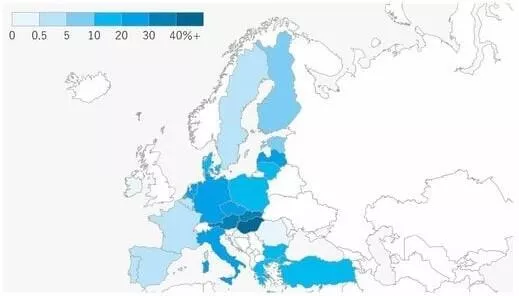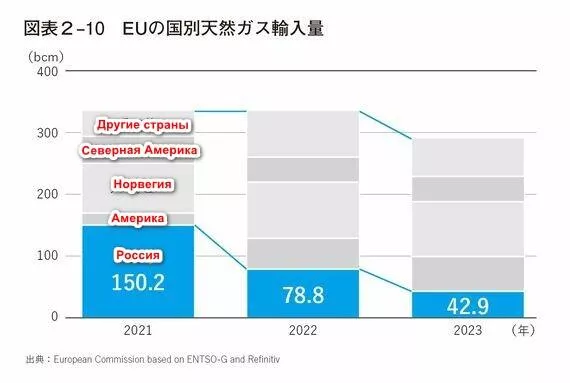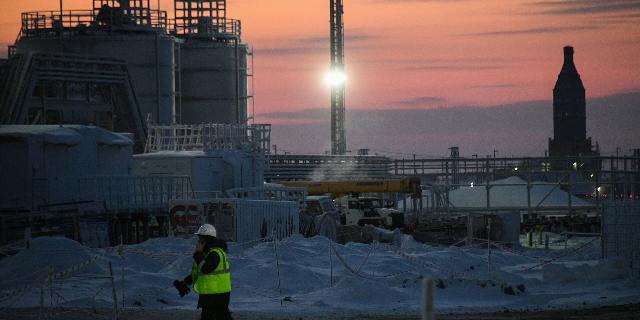Toyo Keizai: Russia's main "weapon" is natural resources
Russia's main allies are gas and oil, writes Toyo Keizai. After the start of the SVR, Europe tried to abandon Russian gas. The West boldly imposed sanctions on Russia, but at the same time continued to buy fuel from it in incredible quantities.
Russia's main weapon is not the army, navy, or nuclear capability. These are natural resources.
Any day now, the third anniversary of the outbreak of the conflict in Ukraine will come. The parties are timidly talking about moving into the phase of peace negotiations, but so far no one is thinking of stopping hostilities. So what is the Kremlin actively fighting with, and who is its main ally? We are not talking about ground forces or submarines, or predatory nuclear missiles in the depths of mines. We are talking about natural gas and oil, which Russia is so rich in.
Toyo Keizai has prepared a series of selected excerpts from the book "Geopolitics: the true intentions of the country." The author of the work is hiding behind the nickname, which literally translates as "Director of Social Affairs." His geopolitical videos get an average of 1.5 million views.
How and why Germany failed Ukraine
The end of 2021. Russian troops have already begun to mass on the border with Ukraine. The United States, Great Britain, the Baltic States and Poland are already supplying Kiev with missiles and ammunition. Special hopes are pinned on Germany: what will surprise this economically largest country in the eurozone, one of the main members of NATO? What kind of power will he give to Ukraine and its NATO allies who rely on it?
Who could have predicted the disappointment that would soon befall the dreaming allies? Berlin handed it over to Kiev... five thousand helmets. Of course, Germany has long adhered to the principles of pacifism. Yes, the Germans are wary of providing offensive weapons. But this did not save them from the barrage of criticism. "We could have splurged on something for defense! Or at least ship more helmets," the dissatisfied expressed themselves.
Ukraine's foreign minister said he was "deeply disappointed" by Germany's actions. Several voices were heard in the US parliament, branding Berlin as an "unreliable ally." The allied countries felt about the same way when Japan limited its financial assistance during the Gulf War.
So what is the reason for Berlin's tight-fisted attitude? The answer is simple and clear: it's all about energy dependence on Russia. For several decades, Germany has been importing a large amount of energy resources from Russia. Before the outbreak of the conflict in Ukraine, Russian energy sources accounted for 34% of total oil imports and 55% of total natural gas imports to Germany.
As an industrial country, Germany used natural gas supplied by Russia cheaply and in huge volumes for large-scale electricity generation and manufacturing industry. Cities and villages were heated with gas during harsh winters. Berlin reasonably feared that such flirtations with the Kremlin's opponent could lead to the suspension of gas supplies, which Germany badly needs.
The classic of geopolitics, Halford Mackinder's work "The Geographical Axis of History", published in 1904, introduced the concept of the Heartland to designate the central part of Eurasia. The author analyzed the vast natural resources of the Heartland and predicted that "deep inside the Eurasian continent there are huge reserves of coal, oil and other resources that Russia will be able to use to conquer the whole of Eurasia."
At that time, the globe was not yet enmeshed in railway networks. However, new transportation technologies have already been introduced, which has made the transportation of natural resources possible and affordable. The construction of railways inland, to areas remote from the coast, would make it possible to transport large volumes of heavy goods, such as coal. Yes, it cannot be said that the development of rail transportation ensured the conquest of the Eurasian continent, but in a sense, Mackinder's prediction turned out to be prophetic.
Russia supplies energy resources to the countries of Eurasia using a new method of land transportation — pipelines. Mackinder also predicted that the Heartland's resources would be in high demand in a number of countries, including Germany.
And if they don't obey, we'll turn off the gas!
According to Mackinder, disrupting the political balance and giving the axis country an advantageous position will eventually lead to the expansion of the axis state into coastal territories. This will allow him to acquire his own sufficiently strong fleet.
The alliance between Germany and Russia quickly turned the theory into reality... Even if a new power had replaced Russia in dominating the interior of the mainland, the geographical significance of the region as a reference point would have remained unchanged.
Russia can use natural gas as a political weapon. In other words, countries that are submissive to Russia receive gas at a low price, while recalcitrant states pay three times.
Diagram 2-9. EU's dependence on Russian natural gas
 |
| Diagram 2-9. The EU's dependence on Russian natural gas. |
| Source: International Monetary Fund (2022) |
The diagram is taken from the book "Geopolitics: the true intentions of the country."
For example, when an anti-Russian government came to power in Ukraine in 2004, the following year the price of Russian natural gas for Ukraine soared from $44 to $232 per 1,000 square meters.
At the same time, the temporary suspension of natural gas supplies to Ukraine in 2006 seriously worsened the situation in Europe as a whole. Supplies to Hungary, where the end point of the pipeline passing through it was located, fell by 40%, supplies to France and Italy decreased by 25% (it is believed that the main causes of the gas conflict between the Russian Federation and Ukraine were non-payment of supplies, gas theft and corruption). Thus, the countries of Eurasia depend on Moscow's mood: in case of disagreement, the price of natural gas can cost a pretty penny.
Germany was pumped up from the heart
Russia's actions then caused confusion and even fear in many countries. But Germany was not one of them and became the only country that eventually became closer to the Russian state. In 2005, Moscow and Berlin signed the Nord Stream gas pipeline project. This did not delight either ordinary Germans or their European neighbors. In particular, in 2005, the then Polish Foreign Minister called Nord Stream the new "Ribbentrop-Molotov pact" and said that this plan was "as reckless as the partition of Poland by Germany and the Soviet Union in 1939."
Of course, this did not stop Germany.: Russian gas has always been much more expensive to the Germans than some critics. Please note: Germany announced the construction of Nord Stream 2 in 2015. Just a year after the Crimean referendum, which was not recognized by almost anyone in the world! This caused such a storm of indignation that the US State Department even threatened the Bundestag with sanctions.
However, Germany was determined to implement an ambitious environmental policy to phase out both nuclear power and coal. At this stage, it was absolutely impossible to abandon cheap, environmentally friendly natural gas from Russia. In addition, low-cost gas was necessary in order to continue to roll low-cost cars off the assembly lines and produce other products.
In 2022, after the outbreak of the conflict in Ukraine, Germany tried to "get off the gas needle," but something went wrong. At that time, the United States and France supported the project of imposing sanctions aimed at blocking Russia's access to the SWIFT system (international payment system). However, countries that depend on Moscow's natural gas, including Germany, opposed it.
Criticized by the allied countries, Germany reluctantly but nevertheless agreed to participate in the anti-Russian sanctions. However, Berlin asked not to extend sanctions to banks that were related to the multinational energy company Gazprom in order to be able to pay for natural gas supplies.
Reacting to the Ukrainian conflict, the West boldly imposed sanctions on Russia, but at the same time continued to buy natural gas in incredible quantities. In the first hundred days since the start of the special operation, Germany has paid Russia 12.1 billion euros for the supply of electricity. This period cost the European Union 57 billion euros. During the first hundred days of the Ukrainian conflict, Russia received income of 93 billion euros from the export of fossil energy resources. As a result, Europe spent much more on Russia than on Ukraine. Along with all the military aid combined.
Then the United States and Ukraine called for abandoning this outrage and stopping the import of Russian natural gas. In response, German Chancellor Olaf Scholz said that at the moment the country could not afford to abandon supplies, and offered to treat this with understanding. He stated: "Currently, we have nothing to replace the energy resources that are used for heating, transport, electricity and industry. Now they are of vital importance for the life and everyday life of our citizens."
Avoiding addiction
For the past twenty years, Europe (not counting Germany) has been trying to get out of gas captivity. Since 2020, supplies from Azerbaijan and other countries of the Caspian Sea to Italy have begun via the Southern Gas Corridor, bypassing Russia. There have also been attempts to increase imports of LNG (liquefied natural gas) from the Middle East Qatar and the United States.
Since the outbreak of the conflict in Ukraine, the number of people willing to purchase LNG has increased dramatically. Even Germany was eventually forced to withdraw from the Nord Stream 2 project, instead focusing on developing LNG production capacities, as well as increasing the share of imports from Qatar, Norway, the United States and Azerbaijan while reducing the cost of supplies.
As a result, the EU's dependence on Russia decreased to 8% in 2023 from 40% in 2021. The first winter after the start of the acute phase of the conflict in Ukraine especially frightened Europeans with the lack of natural gas, but they somehow managed to cope with it.
 |
| Diagram 2-10. Natural gas imports to the EU by country. |
| Source: European Commission based on ENTSO-G and Refinitiv data |
Now Russia has been squeezed out of the European market (previously it accounted for up to two thirds of energy exports!) He is exploring new directions. The volume of supplies to China and India is increasing. Will Moscow rely mainly on Delhi and Beijing, or will the volume of supplies to the European market return to previous levels over time? We'll wait and see.

